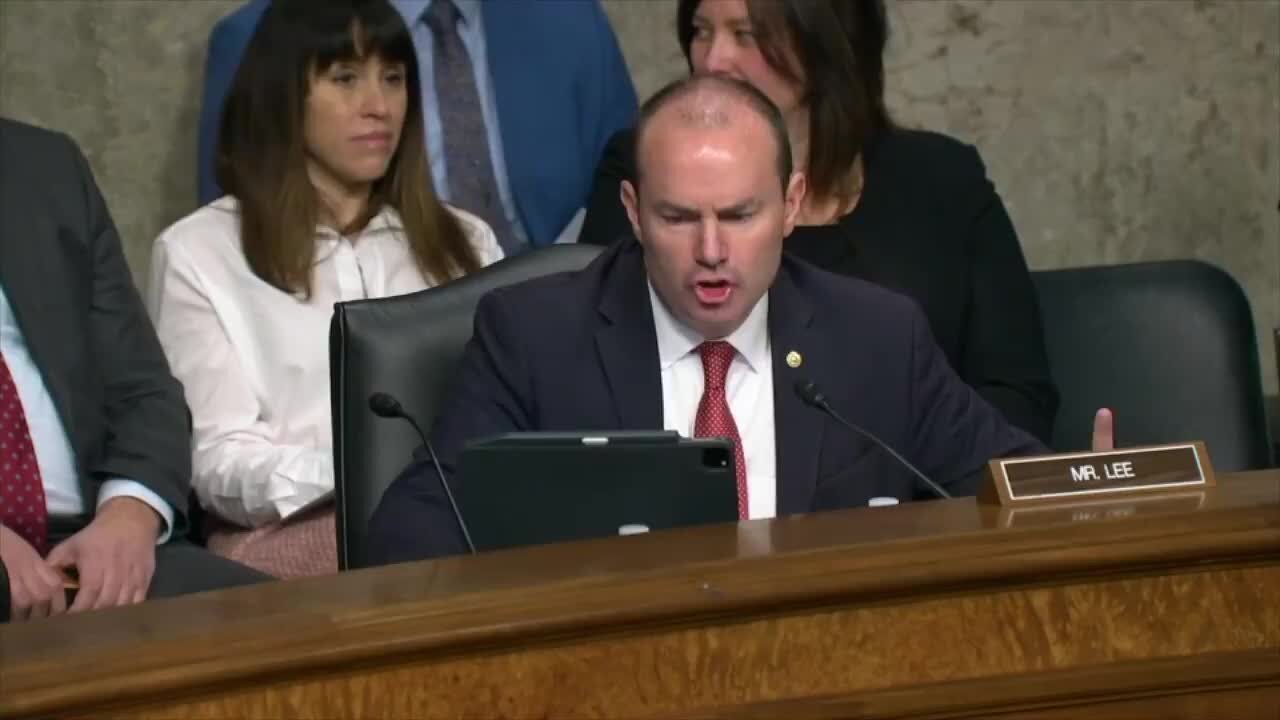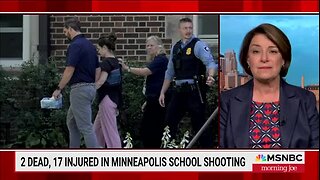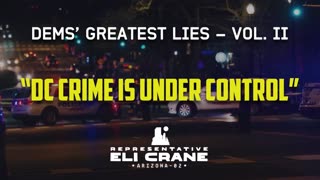Premium Only Content

Not a Single Democrat Witness in Congress Agreed Only Citizens Should Vote in Federal Elections
Lee: “Do you believe that only citizens of the United States should be able to vote in federal elections?”
HEWITT: “We don’t have a position about non-citizens voting in federal elections. We believe that’s what the current laws are. And so, we’re certainly fighting for everyone who’s eligible under the current laws to be able to vote.”
Lee: “Ms. Riordan?”
RIORDAN: “I do not believe that non-citizens should be able to vote in federal elections.”
Lee: “Ms. Camarillo?”
CAMARILLO: “That’s a decision of the state law, but we — I want to emphasize —
Lee: “It’s a decision of state law as to who should vote in federal elections?”
CAMARILLO: “States decide who gets to vote in various elections. And in federal elections, I believe that we should be encouraging people to naturalize and then vote.”
Lee: “Okay. But you’re saying that the federal government should have no say in who votes in a federal election?”
CAMARILLO: “I don’t have a position on that.”
Lee: “Mr. Von Spakovsky?”
VON SPAKOVSKY: “As a first-generation son of naturalized citizens, I believe only citizens should be allowed to vote in all U.S. elections.”
Lee: “Ms. Lakin?”
LAKIN: “Federal law prohibits non-citizens from voting in federal elections and we support and our work focuses on enabling all eligible voters to be able to vote and cast their ballot and have that ballot counted.”
Lee: “Okay. Do you believe that people registering to vote should provide documentary proof of their citizenship in order to register to vote? Mr. Hewitt?”
HEWITT: “I think your first question kind of answers the second. Based upon the applicable rules, federal and state elections or what have you, we know we have to follow those rules. The question is what’s the impact of those rules?”
Lee: “Ms. Riordan?”
RIORDAN: “Yes.”
Lee: “Ms. Camarillo?”
CAMARILLO: “Voter registration cards on affidavits when people sign them, people are signing under federal — under penalties of — depending on the state, either criminal or otherwise, that there —“
Lee: “Can I get a yes or no out of you?”
CAMARILLO: “I’m sorry.”
Lee: “Should they or should they not have to require documentation establishing their citizenship?”
CAMARILLO: “It’s already redundant in many states, and it’s already being asked.”
Lee: “Mr. Von Spakovsky?”
VON SPAKOVSKY: “Yes, all individuals should be required to provide proof of citizenship.”
Lee: “Ms. Lakin?”
LAKIN: “Documentary proof of citizenship requirements are often discriminatory. In fact, we sued the state of Kansas and won litigation on this issue.”
Lee: “Okay. I do find it troubling that these couldn’t both all be answered with a simple yes, and I think if you ask most Americans, overwhelming majority of Americans would say, yeah, you should have to be a citizen to vote in a federal election, and yeah, you ought to be required to prove it. You have to show identification papers when you board an airplane. Unless you’re an illegal alien, of course. But that’s a different question. To go to the doctor in many instances, to pick up a prescription in many instances. All kinds of things require identification. Why not voting? Now, the Carter-Baker report from 2008 — keep in mind that the Carter in Carter-Baker is former President Jimmy Carter — recommended that states require voters to use a real ID compliant identification to ‘ensure that persons presenting themselves at the polling places are in fact the ones on the registration list.’ And I agree with former President Carter on that. And to that end, I’ve authored legislation that would allow states to enforce such identification laws, which are so popular among Americans, and with good reason. The legislation, as compared to the likely unconstitutional John Lewis Voting Rights Advancement Act, would respect the boundaries of federalism. And that’s important always that we do that, and that’s one of our twin structural safeguards in the Constitution. Mr. Von Spakovsky, in your experience, would more robust voter ID laws disenfranchise legal voters?”
VON SPAKOVSKY: “The answer to that is no, and that’s not my opinion. That’s based on turnout data that we now have for more than 15 years, election after election after election. Georgia’s, for example, ID law has been in place since the 2008 election. They’ve seen record registration and turnout of all voters, including black and Hispanic voters there. And all the studies, the ones I cited, showed that when you compare all 50 states, IDs do not keep people from voting, particularly because every state that’s put in an ID requirement will provide a free ID to anyone who doesn’t have one.”
-
 2:36
2:36
Grabien
10 hours agoSen. Klobuchar: I’m So Tired of Some of My Colleagues Who Won’t Stand Up and Vote for Some Stricter National Gun Standards
172 -
 LIVE
LIVE
FyrBorne
9 hours ago🔴Warzone M&K Sniping: I Can Be Your Idol (For Sniping)
625 watching -
 34:26
34:26
CarlCrusher
11 hours agoJake Paul's Crew vs Ancient Skinwalker Canyon
1612 -
 16:07
16:07
Chris From The 740
23 hours ago $0.04 earnedMy BIGGEST Problem with the Ruger RXM – FIXED by Liberty Build Co!
1061 -
 13:29
13:29
Professor Gerdes Explains 🇺🇦
10 hours agoUS Deploys Warships to Venezuela's Coast: A Show of Force Against Putin's Ally
6 -
 12:12
12:12
The Shannon Joy Show
12 hours ago🔥Carcinogens & Fetal Cells In Your New ‘Universal Vaccine’🔥
5422 -
 10:38
10:38
ariellescarcella
10 hours agoOnlyFans Models Fake Being Trans : Queer Activists Are PISSED
86 -
 8:00
8:00
Congressman Eli Crane
15 hours agoThe D.C. Crime Problem | Democrats' Greatest Lies – Vol.2
17.1K9 -
 17:54
17:54
Dr Disrespect
17 hours agoDR DISRESPECT vs VAN DAMME in Hitman 3
72.8K11 -
 2:05:26
2:05:26
Side Scrollers Podcast
19 hours ago4Chan SUES UK Government + Craig Has Mental Illness Fatigue + Knight Rider REBOOT | Side Scrollers
32.4K8